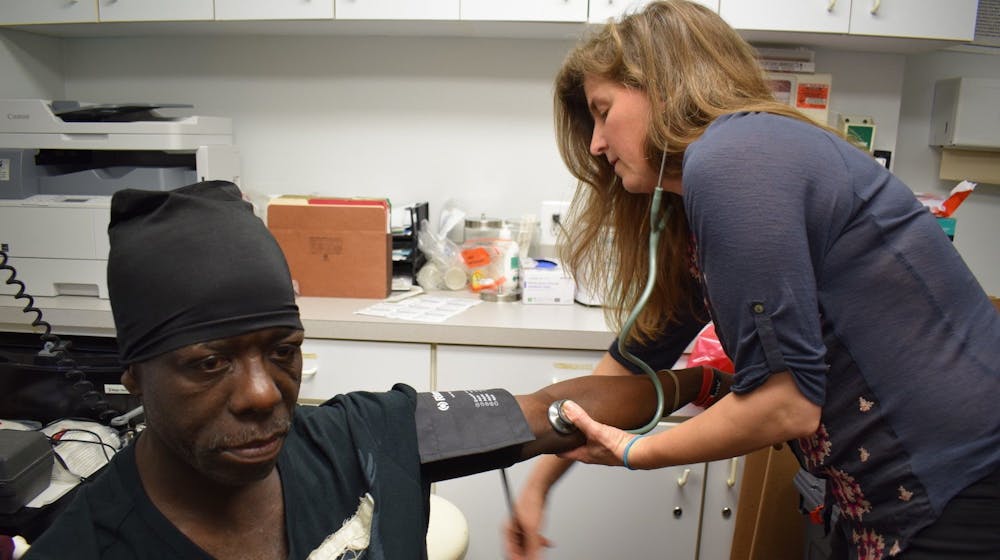If you don’t know to look for it, Friendship Place is easy to miss. From the outside it could be mistaken for any other house, dwarfed by the commercial buildings beside it on Wisconsin Avenue in Tenleytown. But for those who seek it out, Friendship Place, a nonprofit that provides services to people experiencing homelessness, can be life-saving.
Friendship Place first opened in Tenleytown 30 years ago as a community-led effort to support homeless people in the wealthiest part of Washington.
Decades later, its original location is still providing critical services to people in need. There’s a medical clinic on Monday afternoons and a psychiatric clinic on Thursdays. Bottles of soap and shampoo are piled into large bins for distribution. There’s a washing machine and a dryer, as well as a computer station. A mailroom allows those without an address to receive documents they need in order to secure housing or employment. All of these resources are free for those who use them.
“Our goal is to help people build self-esteem,” said Sean Read, Friendship Place’s chief program officer for community solutions.
But Friendship Place’s services go beyond a load of laundry and a mailbox — across the DMV, the organization’s housing programs have helped move countless people off the streets.
Tenleytown is Friendship Place’s original location, but the organization now has a short-term family housing site on Idaho Avenue in Cathedral Heights; a 40-unit apartment complex for men in Columbia Heights; temporary apartment-style housing in Anacostia; veteran and career services and permanent supportive housing on U Street; and veteran services in Greenbelt, Maryland, and Alexandria, Virginia.
The organization employs nearly 170 people, according to Read. Some of those employees once experienced homelessness themselves.
Volunteer opportunities and partnerships with other organizations broaden Friendship Place’s reach even further.
Across all its services, Friendship Place serves over 3,400 people per year, according to its website.
Dignity in Work
One of the organization’s flagship programs is a workforce development initiative called AimHire. By focusing on strengths and experiences people already have, AimHire helps people experiencing homelessness find work and an income.
The program was born over a decade ago in response to the Great Recession of 2008, when nearly 110,000 district residents lived below the poverty line, according to the DC Fiscal Policy Institute.
People would come to Friendship Place saying all they needed was a job to get back on their feet. “This is D.C. — people ask ‘Where are you from?’ What do you do?’” Read said.
“Everyone has something that they can use to be leveraged into an employment opportunity,” he added. “When we can get people working, they're getting that income which helps them with other basic needs, which helps support housing. It’s breaking a cycle of joblessness and homelessness.”
AimHire helped 126 people find work in 2021, according to Friendship Place.
For Read, who has been at Friendship Place for 11 years, the most meaningful part of his work is seeing families find long-term housing stability.
He recalled one family in particular, a household with a child, two parents and a grandparent living together. The grandparent received support from Friendship Place, which allowed both parents to find “meaningful and supportive work,” Read said. That routine helped keep the child in school. Now, eight years later, the family remains in stable housing.
“Ultimately, that is exactly our goal,” Read said.
Transitioning to Housing
Read is also responsible for overseeing the distribution of a $2.5 million grant from the Bezos Day One Fund, a foundation created by Amazon founder Jeff Bezos.
Two other D.C. anti-homelessness groups, House of Ruth and Housing Up, also received donations from Bezos’ fund, as did dozens of other organizations across the country.
The goal of the grant is to cover costs for families transitioning from homelessness to housing. By paying for things like application fees, security deposits and storage units, Read said Friendship Place has been able to ease the financial burden on families moving into a home.
The result, he said, is that people are not only more likely to stay housed for longer, but they can focus on making their home feel meaningful.
“Having a bed when you move in and a couple other pieces of basic furniture increases the likelihood of success,” Read said.
For children in particular, Read said, “the ability to have things to engage with is key. For a kid going from an unstable situation into a stable situation, making a meaningful connection can help with the mental wellness of everyone in the house.”
Because homelessness is often a lagging indicator of changes in employment and housing costs, Read said Friendship Place typically starts to see the impacts of a major event — like a recession or the pandemic — six to 18 months later. That makes it difficult to predict where the organization’s services will be needed next.
But one area where there will always be a need is the search for housing. As housing costs have grown faster than wages over the last several decades, finding affordable homes is a perpetual challenge.
“We’re facing a real lack of affordable housing,” Read said. “You can’t end homelessness without housing.”
gcastroroot@theeagleonline.com
This article is part of The Eagle's 2022 contribution to the Homeless Crisis Reporting Project, in collaboration with Street Sense Media and other local newsrooms. The collective works will be published throughout the week at HomelessCrisis.press.





